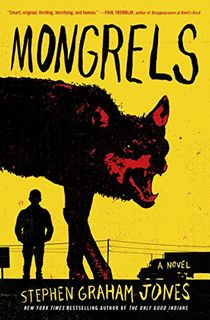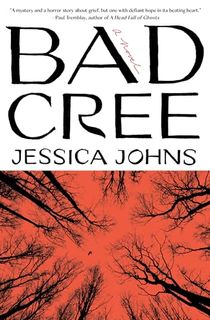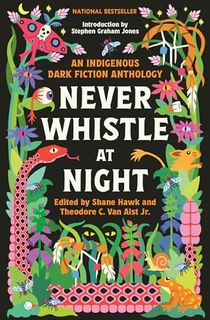Before Stephen Graham Jones wrote the Bram Stoker and Shirley Jackson Award-winning novel The Only Good Indians, he wrote several books spanning horror, science fiction, and fantasy.
Mongrels (2016), which was a Shirley Jackson Award finalist and Bram Stoker Award nominee, might not initially seem like an ideal starting point for Jones’s large body of work.
However, the themes featured throughout Mongrels allow it to be a solid precursor to The Only Good Indians (2020) and The Indian Lake Trilogy as well as a book to catch up on before revisiting Jones’s previous books, such as The Least of My Scars (2013) and Ledfeather (2008).
Mongrels is, by and large, a coming-of-age story. Told through the point-of-view of an intentionally unnamed narrator, the story focuses on the narrator’s family.
The death of his mom and the absence of his dad are never far from his mind, especially as he sees Uncle Darren and Aunt Libby, his mom’s twin sister, as the parental figures he never had. Grandpa is also a central figure, often telling tales about being half man, half wolf.
This leads the narrator to wonder whether Grandpa is actually a werewolf.
What if he is? What if they all are?
After Grandpa’s death, the makeshift family—Aunt Libby, Uncle Darren, and the narrator—have no choice but to leave their Arkansas home. They are, in fact, mongrels after all; part human, part wolf. They cannot control the growling, the pain that comes along with shifting from human to wolf and back again. Shifting is either a dream or a nightmare.
For the narrator, it’s a nightmare to watch helplessly as Aunt Libby and Uncle Darren shift without warning. The family has a history of werewolves falling hard for humans.
In learning his family history, the narrator comes to realize that, “It’s never worked once, though, bringing somebody over to the werewolf side of things. With a werewolf, loving and killing, they’re the same act.”
Jones, a member of the Blackfeet Nation, wrote Mongrels because he was tired of seeing truck stop T-shirts merging the Indian and the wolf.
To that end, Mongrels is not just a werewolf story; it is a social commentary on what it means to live in the shadows; doing what you can to survive, and sometimes that isn’t enough.
Jones writes a captivating story of a family on the run. The family is constantly being hunted, and needs to find a place where they can live safely. But does that place even exist?
The most powerful chapters focus on the lengths that Aunt Libby, Uncle Darren, and the narrator will go to protect each other from danger, near and far.
This is survival at all costs. All you have to do is make it out alive, and not leave Aunt Libby or Uncle Darren behind.
As a result, the trio lives in the shadows in the South, then the Southwest, and ultimately the Southeast, trying to find places where they can stay under the radar.
The horror here is emotional and psychological, with the trio living in a constant state of fear, being haunted by the past and uncertain of the future.
To that end, Mongrels can be seen as an allegory to the ongoing survival of Indigenous people; what it means to survive in a society where your safety isn’t guaranteed, and the only thing you have is each other.
In a small Texas town, Libby disappears. Is she still alive? Darren and the narrator have a narrow escape as they track her down—and are on the run, once again.
In another Texas town, the narrator finds a crush in Brittany, and hopes to stay in one school for more than a year. But another close call forces the trio to be on the road, once again. Hoping to make Florida home, the narrator longs for a sense of belonging, to be a normal teenager for once.
Chapters alternate between following the family on the run with chapters where the narrator imagines himself in a specific career, such as journalist, biologist, mechanic, and even a criminal.
These brief career chapters provide insight into why the narrator is documenting their story. They have nothing else: no identification, no past, no future.
At least they will now have a written history. Maybe someone will remember them? Maybe now they will have a name?
However, in Florida, their past catches up with them. Who is hunting them this time? Will Darren make it out alive? What do you do when your worst nightmare is unfolding right before your eyes?
These fast-paced chapters show Jones’s writing at its best, with unexpected twists and turns as the truth comes to light. Libby and the narrator realize they might have no choice, but to do the unthinkable: leave someone behind.

Mongrels: A Novel
If you enjoy this book, here are some others like it, spanning the 1970s to the present day:

Bad Cree: A Novel
If you’re interested in another story about surviving generational trauma, try Bad Cree by Jessica Johns.

This Thing Between Us
If you’re looking for another story of psychological horror, try This Thing Between Us by Gus Moreno.

Never Whistle at Night: An Indigenous Dark Fiction Anthology
If you’d like an anthology of horror by Native American authors, check out Never Whistle at Night: An Indigenous Dark Fiction edited by Shane Hawk and Theodore C. Van Alst Jr.
Featured image: Alex Perez / Unsplash



